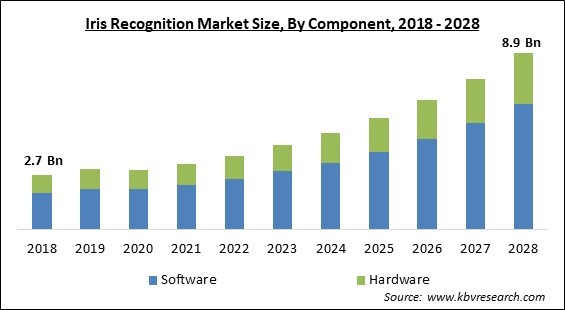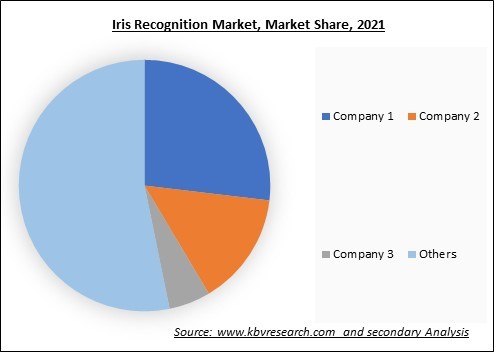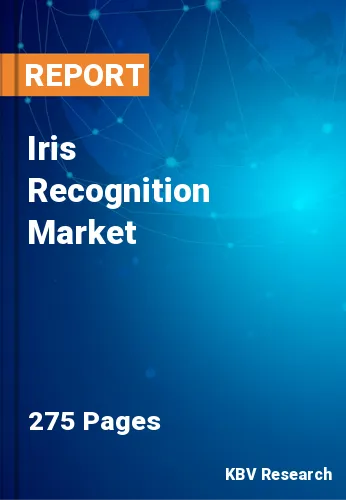The Global Iris Recognition Market size is expected to reach $8.9 billion by 2028, rising at a market growth of 15.6% CAGR during the forecast period.
Iris recognition is a precise and effective technology for protecting information, people, and other sensitive things. Due to its usage in consumer electronics devices like PCs and laptops, iris recognition is becoming more popular. The use of iris recognition technology in laptops has raised general awareness of its convenience and dependability.

Although it is 10 times more expensive than fingerprint scanner technology, iris recognition is 10 times more secure. As a result, the iris recognition market has begun to migrate to reduce costs, and it is anticipated that it will soon be a technology for identity management. The distinctive patterns in people's irises—the colourful circles in their eyes—are measured via iris scanning.
To detect distinctive patterns undetectable to the human eye, biometric iris recognition scanners illuminate the iris with invisible infrared light. Eyelids, Eyelashes, and specular reflections that generally cover some of the iris are detected and excluded by iris scanners. The result is a collection of pixels that only include the iris.
The bit pattern encodes the data in the iris is then extracted by analysing the pattern of the lines and colours in the eye. This bit pattern is digitalized and checked against templates that are kept in a database for identification or verification (one-to-one template matching) (one-to-many template matching).
Iris scanners gather over 240 biometric characteristics, which are distinctive to each eye. The data is subsequently converted into a digital format by the scanners. This digital database contains the numeric representation of the data that was taken from the iris image.
Iris and periocular recognition could become more widely used due to biometrics research sparked by COVID-19. The adoption of COVID-19 has fostered a move from touch-based to contactless technology, which has resulted in a considerable loss for fingerprint recognition methods. The new standard of touchless recognition systems has been established since contact-based technology presents a significant risk to sanitary safety. With this change in mind, iris recognition is thought to be the greatest option by far. Therefore, the COVID-19 has a favourable effect on the market for iris recognition.
One of the first industries to use iris recognition technology, the government sector creates significant demand for its goods and services. This is one of the main drivers of the iris recognition market's expansion. Iris recognition technology is used by government departments, agencies, and organisations worldwide for identification and authentication. For instance, the Next Generation Identification (NGI) systems, and the National Crime Information Center (NCIC) were developed by the Federal Bureau of Investigation (FBI) in collaboration with local, state, tribal, and federal authorities. As a trustworthy method of identification, these systems use iris recognition.
Touchless biometric products are anticipated to have strong demand in the automotive industry in the upcoming years. User/driver authentication, in-cabin personalisation, in-car payment, and intra-vehicle network encryption are just a few of the uses for scanning the vein, face, iris, or finger. Numerous automotive behemoths, including Ford Motor Company (US), Audi AG, and BMW AG, are developing touchless biometric systems for automobile use. In addition, the car industry is embracing iris-based biometric systems because of their high accuracy, non-contact characteristics, and ability to operate in low light.
There are numerous biometric technologies on the market, including voice recognition, vascular recognition, face recognition, fingerprint recognition, and iris recognition. The market acceptability of various technologies varies depending on their benefits and drawbacks. Face and fingerprint recognition technologies are fierce competitors for iris recognition technology. Its high price is one of the main causes of this. Iris scanners cost more than face and fingerprint detection systems, which are their alternatives.
Based on the Component, the Iris Recognition Market is divided into Hardware and Software. In terms of revenue, the Software component sector held the largest market share in 2021. The software part has been divided into sub-segments, including iris recognition software & SDK, database, and analytics solution. Iris recognition software and SDK held a higher market share than hardware components, and a common pattern is projected to persist shortly.

Based on Product, Iris Recognition Market is divided into Scanners, Wearables, Tablets & Notebooks, Personal Computers/Laptops, and Smartphones. The smartphone sub-segment is expected to register the significant market share in the iris recognition market by 2021. Smartphones are regarded as the most cutting-edge technology of the twenty-first century. This smartphone's integration of IRIS technology increases its functionality and ability to provide precise results.
Based on Application, the Iris Recognition Market is divided into E-Payment, Time Monitoring, and Identity Management & Access Control. In 2021, the E-Payment accounted for the significant share in Iris recognition market. Companies are already beginning to use biometric technology for payments and money transfers due to a rise in smartphone usage for banking and shopping purposes. Customers that use solely PINs and passwords are particularly vulnerable to fraud.
Based on the verticals, the Government, Military & Defense, Healthcare, Banking & Finance, Consumer Electronics, Travel & Immigration, Automotive, and Others. Military & Defense segment generated the prominent revenue share in 2021. The usage of biometrics in defence is not simply restricted to one or two functions; it offers a wide range of applications for safeguarding various military operations or actions. Identification and access control are the two most crucial biometrics applications in the defence industry.
| Report Attribute | Details |
|---|---|
| Market size value in 2021 | USD 3.3 Billion |
| Market size forecast in 2028 | USD 8.9 Billion |
| Base Year | 2021 |
| Historical Period | 2018 to 2020 |
| Forecast Period | 2022 to 2028 |
| Revenue Growth Rate | CAGR of 15.6% from 2022 to 2028 |
| Number of Pages | 274 |
| Number of Tables | 499 |
| Report coverage | Market Trends, Revenue Estimation and Forecast, Segmentation Analysis, Regional and Country Breakdown, Companies Strategic Developments, Company Profiling |
| Segments covered | Product, Application, Component, Vertical, Region |
| Country scope | US, Canada, Mexico, Germany, UK, France, Russia, Spain, Italy, China, Japan, India, South Korea, Singapore, Malaysia, Brazil, Argentina, UAE, Saudi Arabia, South Africa, Nigeria |
| Growth Drivers |
|
| Restraints |
|
Based on geography, the Iris Recognition Market is divided into North America, Europe, Asia Pacific, and LAMEA. In terms of revenue, North America currently owns the largest share, and it is predicted that the region will continue its dominance during the projected period. The main factors fueling the growth in this region are the presence of significant players and massive investments in R&D activities to advance cutting-edge technologies. Additionally, it is anticipated that installing ocular scanners at US borders will increase demand in this industry.
Free Valuable Insights: Global Iris Recognition Market size to reach USD 8.9 Billion by 2028

The leading players in the market are competing with diverse innovative offerings to remain competitive in the market. The below illustration shows the percentage of revenue shared by some of the leading companies in the market. The leading players of the market are adopting various strategies in order to cater demand coming from the different industries. The key developmental strategies in the market are Acquisitions, and Partnerships & Collaborations.
The market research report covers the analysis of key stake holders of the market. Key companies profiled in the report include Thales Group S.A., IDEMIA SAS (Advent International, Inc.), NEC Corporation, Aware, Inc., M2SYS Technology, Inc., Unisys Corporation, IrisGuard Ltd., Iris ID, Inc, and Princeton Identity, Inc.
By Application
By Product
By Component
By Vertical
By Geography
The global Iris Recognition Market size is expected to reach $8.9 billion by 2028.
Governmental agencies are using iris recognition technology more often for identification and authentication are driving the market in coming years, however, Competition With Other Biometric Technologies restraints the growth of the market.
Thales Group S.A., IDEMIA SAS (Advent International, Inc.), NEC Corporation, Aware, Inc., M2SYS Technology, Inc., Unisys Corporation, IrisGuard Ltd., Iris ID, Inc, and Princeton Identity, Inc.
The Banking & Finance segment is generating highest revenue share in the Global Iris Recognition Market by Vertical in 2021 thereby, achieving a market value of $2 billion by 2028.
The Scanners segment is leading the Global Iris Recognition Market by Product in 2021 thereby, achieving a market value of $4.3 billion by 2028.
The Asia Pacific market dominated the Global Iris Recognition Market by Region in 2021, and would continue to be a dominant market till 2028; thereby, achieving a market value of $3.3 billion by 2028.
Our team of dedicated experts can provide you with attractive expansion opportunities for your business.

